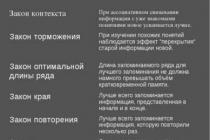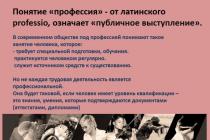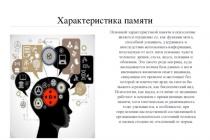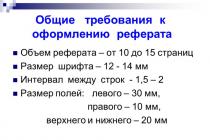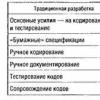1 slide

2 slide
The law of context When associating information with already familiar concepts, the new is learned better. The law of inhibition When studying similar concepts, the effect of "overlapping" the old information with the new one is observed. The law of the optimal length of the series The length of the memorized series for better memorization should not greatly exceed the amount of short-term memory. The law of the edge The information presented at the beginning and at the end is best remembered. Law of Repetition Information that is repeated several times is best remembered. The Law of Incompletion Incomplete actions, tasks, unsaid phrases, etc. are best remembered.

3 slide
Memory properties Accuracy Volume Speed of memory processes Speed of reproduction processes Speed of forgetting processes

4 slide

5 slide
Patterns of memory Memory has a volume limited by the number of stable processes that are basic when creating associations (connections, relationships). The success of recall depends on the ability to switch attention to basic processes, restore them. The main technique: a sufficient number and frequency of repetitions. There is such a pattern as the forgetting curve.

6 slide
Typologies of memory There are various typologies of memory: according to sensory modality - visual (visual) memory, motor (kinesthetic) memory, sound (auditory) memory, taste memory, pain memory; by content - figurative memory, motor memory, emotional memory; according to temporal characteristics - long-term memory, short-term memory, ultra-short-term memory;

7 slide

8 slide
Memory Memory is one of the mental functions and types of mental activity designed to store, accumulate and reproduce information. The ability to store information about the events of the external world and the reactions of the body for a long time and repeatedly use it in the sphere of consciousness to organize subsequent activities.

9 slide
Aphorisms on the theme of a girl's memory: A girl's memory does not remember badly, she just knows how to forget what she does not need. Girl's memory - when you don't remember with whom and when you become a woman. A girl's memory is not amnesia, it's editing in favor of gender.

10 slide
Girl's memory According to doctors, the memory of women who are usually credited with girl's memory is affected by their characteristic monthly cycle. Another reason is pregnancy. In the body of the expectant mother, the pregnancy hormone, progesterone, is actively produced. Under its influence, the emotional state of a woman, her life priorities and her ability to remember change.

11 slide
Photographic memory Eideti zm (better known as photographic memory) (from ancient Greek εἶδος - image, appearance) - a special nature of memory, mainly for visual impressions, which allows you to keep and reproduce an extremely vivid image of a previously perceived object or phenomenon.

12 slide
Childhood amnesia Children's amnesia stands out in particular - loss of memory for events of early childhood. Apparently, this type of amnesia is associated with the immaturity of the hippocampal connections, or with the use of other methods of encoding "keys" to memory at this age. However, there is evidence that the memories of the first years of life (and even intrauterine existence) can be partially updated in altered states of consciousness.

13 slide
Types of memory impairment Hypomnesia - weakening of memory. Memory impairment may occur with age and / and as a result of any brain disease (sclerosis of cerebral vessels, epilepsy, etc.). Hypermnesia - an abnormal sharpening of memory compared to normal indicators, is observed much less frequently. People with this feature forget events with great difficulty (Shereshevsky) of Paramnesia, which imply false or distorted memories, as well as a displacement of the present and the past, the real and the imaginary.

14 slide
Memory processes Forgetting is the loss of the ability to reproduce, and sometimes even recognize, previously memorized. Most often we forget what is insignificant. Forgetting can be partial (reproduction is incomplete or with an error) and complete (impossibility of reproduction and recognition). Distinguish between temporary and long-term forgetting.

15 slide
Memory disorders A large amount of knowledge about the structure and work of memory, which is now available, was obtained by studying the phenomena of its violation. Memory impairment - amnesia - can be caused by various reasons. In 1887, the Russian psychiatrist S. S. Korsakov, in his publication On Alcoholic Paralysis, first described the picture of severe memory disorders that occur with severe alcohol poisoning. The discovery called "Korsakov's syndrome" is firmly established in the scientific literature. Currently, all memory disorders are divided into:

16 slide
Memory processes Reproduction and recognition is the process of updating the elements of past experience (images, thoughts, feelings, movements). A simple form of reproduction is recognition - the recognition of a perceived object or phenomenon as already known from past experience, the establishment of similarities between the object and its image in memory. Reproduction is voluntary and involuntary. With an involuntary image pops up in the head without the efforts of a person. If in the process of reproduction there are difficulties, then there is a process of recall. Selection of elements necessary in terms of the required task. The reproduced information is not an exact copy of what is imprinted in memory. Information is always being transformed, rearranged.

17 slide

18 slide
Memory processes Memorization is a memory process through which traces are imprinted, new elements of sensations, perception, thinking or experience are introduced into the system of associative links. The basis of memorization is the connection of material with meaning into one whole. The establishment of semantic connections is the result of the work of thinking on the content of the memorized material. Storage - the process of accumulation of material in the structure of memory, including its processing and assimilation. The preservation of experience makes it possible for a person to learn, develop his perceptual (internal assessments, perception of the world) processes, thinking and speech.

19 slide
Mnemotechnical methods of memorization: The formation of semantic phrases from the initial letters of the memorized information. Rhyming. Memorization of long terms or foreign words with the help of consonants. Finding bright unusual associations (pictures, phrases) that are connected with memorized information. Cicero's method on spatial imagination. Aivazovsky's method is based on the training of visual memory. Methods for memorizing numbers: patterns; familiar numbers.

20 slide

23 slide

24 slide
Psychologists advise doing several repetitions: Rational repetition mode: If there are two days, the first repetition is immediately after the end of reading; second repetition - 20 minutes after the first repetition; the third repetition - 8 hours after the second; fourth repetition - 24 hours after the third. If you need to remember for a very long time the first repetition - immediately after memorization; second repetition - 20-30 minutes after the first repetition; the third repetition - 1 day after the second; fourth repetition - 2 - 3 weeks after the third; fifth repetition - 2 - 3 months after the fourth repetition Meaningful memorization is 9 times faster than mechanical memorization (in his experiments, Ebbinghaus memorized the text of Byron's Don Juan and an equal list of meaningless syllables). Ebbinghaus also owns the discovery of the "edge effect" - a phenomenon showing that the material that is best remembered is at the beginning and at the end.

25 slide
Memory records The South African politician Jan Christian Smuts memorized 5,000 books in his old age, and the Burmese Visittabm Vumsa in 1974 recited 6,000 pages of Buddhist canonical texts by heart. The Japanese Hideaki Tomoyori named the number "pi" from memory with an accuracy of 40,000 decimal places. On October 14, 1967, Mehmed Ali Khalisi from Ankara recited 6666 verses of the Koran from memory in six hours. The perfection of Mehmed's memory was attested by a dozen academicians present at the reading. Valery Lavrinenko remembers 100 characters in two and a half minutes, and 200 in three, while making a maximum of two or three mistakes. It reproduces the numbers in any order and will describe the appearance of the people who proposed those numbers. Memory for phone numbers is especially useful. Chinese Gu Yanglin, at 26, remembers 15,000 phone numbers in Harbin. Paula Prentice, a call center operator in Tasmania, remembers 128,603 subscribers' phone numbers, names, addresses, institutions. American Barbara Moore performed 1852 songs on the piano from memory. Her "concert" lasted from October 25 to November 13, 1988! The cashier of the Polish football club "Gornik" Leopold Held remembered not only all the results, all the details of the club's games, but also the total amount of income from each of these matches for all 12 years of his work.
All living beings have memory. Animals have genetic memory (stored in the genotype and inherited) and mechanical (based on the repetition of actions). Memory Memory is a complex process of remembering, reproducing and storing information that continues throughout a person's life.




For example, you need to remember to tell a friend to take a ball outside, remember to buy bread in the store, etc. But now the day has passed, and many details associated with it fade into the background. In this case, the information was stored for a short time: seconds, minutes or several hours.




When, on the contrary, the goal is not set, and volitional efforts are not applied, but the person remembers some action or event, then this is involuntary memorization. For example, while watching a movie, we do not set ourselves the goal of remembering anything, but after some time we can remember many scenes of this movie.





Simple events that left a strong impression on a person are remembered IMMEDIATELY, PERMANENTLY, FOR A LONG TIME. More complex, but less interesting events, a person can experience dozens of times, but they do not remain in memory. The law of forgetting (German psychologist G. Ebbinghaus) The law of motivated forgetting (S. Freud) A person has a tendency to forget psychologically unpleasant




VOLUME (capabilities of memorizing and storing information) SPEED OF MEMORY (speed of arbitrary memorization) READINESS FOR REPRODUCTION (use of available information in practice) ACCURACY (accurately store, accurately reproduce information imprinted in memory) DURATION OF STORAGE (retention of necessary information for a certain time)


Description of the presentation on individual slides:
1 slide
Description of the slide:
What is memory? Completed by: Valiullina Aisha Head: Guskova Elena Anatolyevna
2 slide
Description of the slide:
The purpose of the work: Find out what memory is, the possibilities of human memory, the study of memory in children of the 3rd "B" class. Tasks: To study the features and types of memory; Determine the types of memory in students; To carry out diagnostics on the study of memory in students of the 3rd "B" class; Analyze, evaluate and compare the memory of students; Learn ways to develop memory; Develop recommendations with exercises for students. Hypothesis: Suppose that the memory of all children is the same.
3 slide
Description of the slide:
PLAN 1. Memory. What is its role in our life? 2. Sense organs and types of memory. 3. What is the peculiarity of human memory. 4. Possibilities of human memory. Some laws of memory. 5. Negative factors affecting memory. 6. Carrying out diagnostics and summing up. 7. Conclusion.
4 slide
Description of the slide:
Memory. What is its role in our life? Memory is the ability of a person to save his knowledge and experience and use it in his life. Memory is connected to the human brain. The brain receives various information, processes it and stores it. If we did not have a memory, when we wake up, we would not understand where and why we need to go, and what to do there. We would not remember ourselves, our name, address. They would forget their native language and could not say a word. They felt hungry and thirsty, but did not remember where to get food and water.
5 slide
Description of the slide:
A person begins to memorize already in the womb. According to scientists, the memory of the human fetus begins to work as early as 20 weeks.
6 slide
Description of the slide:
Sense organs and types of memory We receive information through different sense organs: sight, hearing, smell, touch and taste. Depending on what information we remember, we can distinguish: memory for movements (motor), memory for emotions, feelings, experiences (emotional), for images (figurative), memory for the location of objects in space, faces, numbers, etc. d. Accordingly, they distinguish: visual auditory olfactory tactile gustatory
7 slide
Description of the slide:
Feature of human memory All living beings have a memory. Even insects have primitive forms of memory. Human memory is more multifaceted. Only a person has a memory for words (verbal memory). People have long realized that memory is a powerful tool. We know a number of historical figures who became famous and achieved success thanks to their extraordinary memory. For example, according to contemporaries, the commanders Julius Caesar and Alexander the Great knew by sight and by name all their soldiers. And this is about 30 thousand people! The philosopher Seneca was able to repeat 2,000 unrelated words heard only once. 150 repetitions so that the worm "remembers" which way to move safely Alexander the Great Julius Caesar Philosopher Seneca
8 slide
Description of the slide:
MEMORY RECORDS. The South African politician Jan Christian Smuts memorized 5,000 books in his old age, and the Burmese Visittabm Vumsa memorized 6,000 pages of Buddhist canonical texts in 1974. On October 14, 1967, Mehmed Ali Khalisi from Ankara recited 6666 verses of the Koran from memory in six hours. Valery Lavrinenko remembers 100 characters in two and a half minutes, and 200 in three, while making a maximum of two or three mistakes. It reproduces the numbers in any order and will describe the appearance of the people who proposed those numbers. Memory for phone numbers is especially useful. Chinese Gu Yang Lin, at the age of 26, remembers 15,000 phone numbers in Harbin. Paula Prentice, a call center operator in Tasmania, remembers 128,603 subscribers' phone numbers, names, addresses, institutions. Samvel Gharibyan unmistakably reproduces 1000 words dictated to him, arbitrarily chosen from ten languages. American Barbara Moore performed 1852 songs on the piano from memory. Her "concert" lasted from October 25 to November 13, 1988!
9 slide
Description of the slide:
But not all talented and successful people had a phenomenal memory. Man has long invented a number of techniques that can help our memory. If we want to learn something, repetition of the material is one of the important conditions for memorization. But the tedious "memorization" of the material may not always be useful. Repetitions should be distributed in time. Possibilities of human memory. Some laws of memory If there is a lot of information to be remembered, it must be structured. For example, in order to better remember and retell the text, we can do the following: - highlight the main ideas, - draw up a story plan, - use illustrations that are associated with the content of the text.
10 slide
Description of the slide:
An example of mnemonics is the well-known expression: "Every hunter wants to know where the pheasant is sitting." It helps us remember the order of the colors in the rainbow. An easy-to-remember rhyming grammatical rule: Zhi -, hiss - write with the letter “and” is another example of a mnemonic device. Mnemosyne - Goddess of Memory In Greek mythology there was a goddess - Mnemosyne, wife of Zeus, mother of nine muses. The Greeks revered her, which is why the art of memorization was named after her. Mnemonics has its roots in antiquity, at least 2,000 years old. The art of memorization was called mnemonics (or mnemonics) - this is the art of memorization, it means a set of techniques and methods that facilitate memorization and increase memory capacity by forming artificial associations (connections).
11 slide
Description of the slide:
One of the effective methods of memorization is the usual "cheat sheet". When we prepare it, we remember it better. For example, we prepare “cheat sheets” with a list of products when we go to the store. Possibilities of human memory. Some Laws of Memory There are several laws of memory. For example: - rare and strange phenomena are remembered better; - it is better to remember the beginning and end of a book, story, film, etc.; - unfinished actions, deeds and events are remembered better than completed ones.
12 slide
Description of the slide:
Possibilities of human memory. Some laws of memory A few tips on how to "help" your memory when preparing school assignments: - Do not overload your attention while studying with a large number of objects on the table - Break the work into "blocks": 20-30 minutes of studying one object, then a short rest - If you feel If you are tired of one activity, switch to another. - Do not load only one type of memory: try to speak and write during classes - Concentrate on the main lesson, do not be distracted by TV and computer.
13 slide
Description of the slide:
Negative factors affecting memory: Negative psychological state (excitement, stress, etc.); Chemical substances; Medications Smoking; Alcohol.
14 slide
Description of the slide:
Do you have a good memory? (test) It is said about older people that due to increasing sclerosis, they become absent-minded and forgetful. In fact, forgetfulness is not a "privilege" only for the elderly. Alas, "leaky" memory can be in people of different ages. What is your memory? To answer this question, use the following test.
15 slide
Description of the slide:
Within 1 minute - put a clock in front of you - read 25 words, close the text and in 5 minutes write down in any order all the words that you managed to remember. Count the number of words written and rate each word written as 1 point. Based on your scores, determine which category you fit into. Cow, mother, elephant, scrap, potato, woman, hare, spoon, floors, light bulb, radio, film, bouquet, grass, plane, aroma, heart, month, car, train, helicopter, Carpathians, hay, pass, century.
16 slide
Description of the slide:
TEST RESULTS 6 points or less. Your memory (primarily visual) is not in the best condition. But it is not at all hopeless - engage in regular memory exercises, such as reading books, memorizing texts, etc. Mental counting also helps. Take vitamins. If necessary, consult a doctor or psychologist about individual methods for preventing forgetfulness. 7-12 points. Your memory is not so bad, but you apparently do not know how to concentrate, and this always interferes with memorization. 13-17 points. Your results are quite decent, and you can count on your memory to be good in most cases. 18-21 points. An excellent result, which proves that you have an outstanding memory. You can force yourself to focus, therefore, you have sufficient will. Don't worry about your memory. Over 22 points. You have a wonderful, if not phenomenal, memory!
Slide
Summing up my work, I can say that the goals and objectives set by me at the beginning of the work, I consider achieved. The above facts and diagnostics suggest that the memory of people is different. Data processing shows that auditory memory predominates in some, while visual memory predominates in others. But there are those who have well-developed combinations of all types of memory. As a result of my experiments, I received statistical data on the development of auditory and visual memory among classmates, found out what material they remember better and what is more interesting for them. We must remember that our memory largely depends on us. Memory can be improved with the help of special exercises, memory can be improved by constantly memorizing poems. Active development of memory occurs as a result of reading, writing, speaking, reading a monologue aloud and then there will be no need to carry notebooks with you. Learn to say “yes” to yourself and that will be the solution.

Memory characteristic
The main characteristic of memory in psychology is its reflection as a brain function capable of assimilating, retaining and subsequently using information received from all five basic human senses: sight, hearing, taste, touch and smell. This is a kind of matrix, which contains a complete database of all the available life experience of an individual, linking his past and present, without which humanity would hardly be able to survive and develop as a biological species. Psychology, as a science, unlike medicine, works mainly with the lifetime type of memory, although its genetic variety is also taken into account, in particular, when determining the hereditary component in the organization of a person’s mental states and assessing the degree of their deviations from the norm.

Forget or remember?
If we talk about the mechanisms of memory, then in psychology they are divided according to their main functions: the need to remember the information received, save it, reproduce it if necessary and forget it if it is of little significance. By the way, forgetting does not mean the complete erasure of unnecessary files. They are simply stored in deeper "archives" and extracted from there at the impulse request of that part of our consciousness that is responsible for the current life experience and filtering it in order of importance.

Forget or remember?
The key to success in any kind of human activity is the development of memory, and psychology offers a lot of techniques that can help you remember and store the information you receive for a long time in the smallest detail. Naturally, the foundations for the development of attention and memory in human psychology are laid in childhood, and it is better to start building a solid foundation for a "library of accumulated knowledge about the outside world" in the first decade of a child's life, since children's memory is more flexible and tenacious, although at a later age. , if desired and using various memorization techniques, it is possible to learn how to quickly extract from the "storerooms of the thinking process" all the information necessary at the moment.

One step, two steps...
The structure of memory in human psychology is usually a three-level ladder, the steps of which are arranged according to the hierarchy of their temporal component.

sensory memory
The shortest in duration is sensory memory, the data retention period of which is, at most, half a second. It processes information coming from the sense organs, and if the "higher authorities" in the form of specific centers of the brain did not show due attention to it, then the sensory component of our memory safely removes unnecessary material from its "basket" and fills the cells with new information receipts.

short term memory
The next level on our ladder is short-term memory, which is longer than sensory memory but still has its limits. For example, the amount of memorized material is reduced to 5-7 information units. Moreover, 7 is the limit, and if you need to learn more information, then the brain has to rearrange the symbols in order to fit them into the 7 cells allocated to it by short-term memory.

long term memory
For longer storage and subsequent replay of memories, there is a long-term memory, which also has its drawbacks, in particular the time spent searching for the necessary information. But nevertheless, the whole machine works quite quickly and smoothly, so that the vast majority of the requested data is “served to the table” on time and with little or no distortion.


Nature has thought of everything for us and we can only be infinitely grateful to her for all the wonderful moments of our lives, which we remember and for those negative memories on which we have the opportunity to learn, drawing lessons.
Completed by: student of group 132, I course Kiseleva Maria Checked by: teacher of age-related anatomy Akaykina Yu.A. Tomsk 2014 Department of secondary vocational and primary vocational education of the Tomsk region. Regional state budgetary educational institution. "Tomsk State Pedagogical College." (OGBOU "TGPC")

Memory is one of the mental functions and types of mental activity, designed to store, accumulate and reproduce information. The ability to store information about the events of the external world and the reactions of the body for a long time and repeatedly use it in the sphere of consciousness to organize subsequent activities

There are 4 memory processes: Memorization is a memory process through which traces are imprinted, new elements of sensations, perception, thinking or experience are introduced into the system of associative links. The basis of memorization is the connection of material with meaning into one whole. The establishment of semantic connections is the result of the work of thinking on the content of the memorized material.

Storage is the process of accumulating material in the structure of memory, including its processing and assimilation. The preservation of experience makes it possible for a person to learn, develop his perceptual (internal assessments, perception of the world) processes, thinking and speech. Reproduction and recognition is the process of updating the elements of past experience (images, thoughts, feelings, movements). A simple form of reproduction is the recognition of the perceived object or phenomenon as already known from past experience, the establishment of similarities between the object and its image in memory. Reproduction is voluntary and involuntary. With an involuntary image pops up in the mind without the efforts of a person.

Forgetting is the loss of the ability to reproduce, and sometimes even recognize, previously memorized. What is forgotten most often is that which is insignificant. Forgetting can be partial (reproduction is incomplete or with an error) and complete (impossibility of reproduction and recognition). Distinguish between temporary and long-term forgetting.





Basic types of memory Short-term memory Short-term memory allows you to remember something after a period of time from a few seconds to several minutes without repetition. Repetition preserves the contents of short-term memory. Its capacity is very limited. Modern estimates of the capacity of short-term memory are usually 4-5 objects. There are hypotheses that short-term memory relies primarily on an acoustic (verbal) code for storing information and, to a lesser extent, on a visual code.

Long-term memory Long-term memory can store much more information for a potentially infinite amount of time (lifetime). For example, some 7-digit phone number can be stored in short-term memory and forgotten after a few seconds. On the other hand, a person can remember by repeating a phone number for years to come. Long-term memory is supported by more stable and unchanging changes in neural connections widely distributed throughout the brain.


1. How many phone numbers do you keep in your head? A few - those that I constantly use - 2. Not a single one, sometimes I even forget mine - 1. I didn’t count exactly, but a lot - Does it happen that you can’t remember what you wanted to talk to a person about? Happens if I'm interrupted - 1. Never, it annoys me in others too - 3. Happens if it's something inconsequential - Can you remember any favorite clothes from preschool childhood? Of course, and not one - 3. No, if only from the photo - 1. With difficulty, but I remember the toys - 2.

4. Can you forget about an important meeting? Periodically I suffer from this - 1. A few times it happened when I forgot to write it down - 2. No, if it is appointed in the foreseeable future - Do you often come from the store without the right purchase? Insuring - going through all departments - 2. No, I remember exactly what I need - 3. Yes, if there are more than three necessary purchases - Can you accurately reproduce what you did three days ago? Yes, if something outstanding happened - 2. Only in general terms - 1. I think so - 3.

7. Do you remember the words of children's or drinking songs? I don’t remember, because I never knew - 1. No more than a couple of verses and a chorus - 2. I remember, and I sing - Do you remember the name of an old friend with whom you have not communicated for many years? Yes, if we were close before - 2. No, this is a problem for me - 1. If we talked, I will definitely remember - Do you forget about the birthdays of your loved ones? No, but this is the merit of the notebook - 2. Yes, they don’t even take offense at me anymore - 1. No, I even remember how old someone is - 3.

You scored: 16 or less points You are distinguished not only by the lack of memory, but also by distracted attention. You can, of course, be touched by this, but it is difficult to live with such a “set”. It is possible that you simply do not have enough self-organization and a primitive weekly journal would greatly facilitate your existence. But it’s better to start paying attention to the development of memory, solve puzzles and crosswords, learn poetry and foreign languages. From 17 to 23 points Your memory is rather mediocre. Perhaps the problem is the large amount of information that your head is full of, but it is not always possible to extract the desired “file”. Therefore, unload your head using modern reminder tools: at work - a computer, electronic notebooks, at home - a mobile phone, timers and an alarm clock. 24 or more points Memory and attention are your forte. Perhaps this is a natural quality, but still you should not “overload”. Psychologists say that people who never forget anything live in a state of constant tension, feel the burden of anxiety and external prohibitions. And besides, they often deprive themselves of the joy of creativity and discovery.



